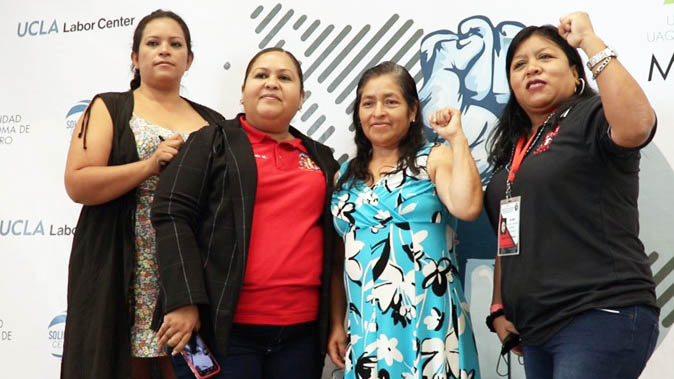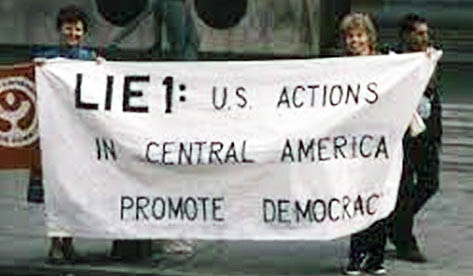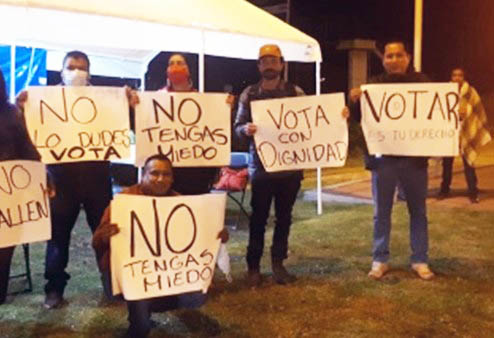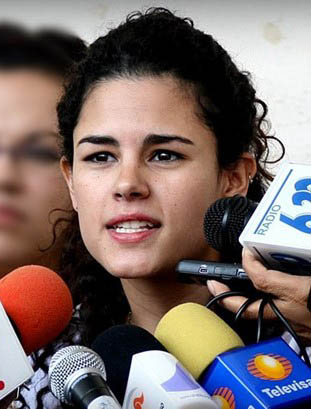|
|
|
|
The weekly newsletter of the México Solidarity Project |
|
|
|
Online at mexicosolidarityproject.org |
|
June 7, 2023/ This week's issue/ Meizhu Lui, for the editorial team |
|
|
In Querétaro, a new Labor Center welcomes Mexican Workers Union League general secretary Julieta Mónica Morales, Los Mineros political affairs secretary Imelda Jiménez, National Democratic Independent Union of Farm Workers general secretary Abelina Ramírez, and Independent National Union of Workers in Industries and Services general secretary Rosario Moreno. Credit: Solidarity Center/Ulises Vidal |
|
Rising ‘with a Little Help from Our Friends’ |
|
If you work in an auto plant in Detroit, you may seem to have little in common with Mexican workers who live half a continent away and speak a language you don’t understand. But if you look at the work they do and who owns the factory where they do it, the lives those Mexican workers are living start to look awfully familiar.
One big difference: how workers in the United States and México have over the years experienced unions. Article 123 of the Mexican Constitution of 1917 gave workers the right to organize, well before the Wagner Act of 1935 gave US workers that same right. In México, unfortunately, exercising that right has always been especially difficult.
Mexican unions early on became tied to the ruling PRI political party, and Mexican union “leaders,” over time, ended up focusing more on stuffing their own pockets than helping workers fill theirs. Their PRI fixers, meanwhile, looked the other way as these corrupt leaders even engaged in violence to ensure worker docility.
With the 2018 election of AMLO and the adoption of worker protections in the new US-México-Canada trade agreement that would soon follow, Mexican workers suddenly had the space to self-organize. To seize that opportunity, to learn how to operate in the entirely redesigned Mexican labor system, Mexican workers would get some help from their friends. In Querétaro, for instance, a new Labor Center supported by the US-based Solidarity Center and the UCLA Labor Center offers a place where Mexican worker leaders — like those we picture above — can learn from each other and deepen their organizing skills.
How’s the overall organizing going? In our interview this week, Tim Beaty, a veteran activist who now sits on the US Independent Mexican Labor Experts Board, offers his assessment of México’s current labor scene. The obstacles, he cautions, remain daunting. But the more that US and Mexican workers can see themselves as part of the same hemispheric production line, the closer the tidal wave that will lift all workers! |
|
|
|
Don’t miss an issue! Sign up for a free México Solidarity Bulletin subscription. |
|
|
|
|
In Mexico’s Workplaces, a Sea Change Beginning |
|
Tim Beaty’s union work began in Florida back in the 1980s as staff for low-income workers whose ranks included many immigrants from México, the Caribbean, and Central America. In the 1990s, Beaty worked as the Americas representative for Public Services International and helped unions across the Americas fighting privatization and assorted other neoliberal initiatives. He would later direct the Mexico City office of the Solidarity Center, work at the AFL-CIO International Department, and then, until last year, serve as the Teamsters global strategies director.
How did you happen to become so deeply internationalist in your labor orientation? |
|
|
That goes all the way back to my college days, when I lived for a year in Latin America. Then, in the 1980s, as one of many union activists who opposed the AFL-CIO’s “Cold War” international policies, I had a particular interest in El Salvador, where the AFL’s American Institute for Free Labor Development — AIFLD — was pushing an anti-communist agenda that intentionally created divisions between unions. |
|
Many of us would go on to support the “New Voice” slate that brought John Sweeney into the AFL-CIO’s top leadership. Sweeney, once in office as president, restructured the international policy and staff.
Now you serve on the Independent Mexico Labor Expert Board. How did this board get created? Where do you get your info? |
|
|
Photo: Peace History |
|
The second free trade agreement between México, the US, and Canada — the USMCA that went into effect in 2020 — addressed labor’s critique of NAFTA and other trade agreements that had failed to meaningfully protect worker rights. The new USMCA contained provisions that put worker rights on an equal footing with commerce.
The pact includes a “rapid response labor mechanism” that lets workers lodge direct complaints against companies that violate their rights — and gives workers the right to an expedited answer from the US trade representative. México, meanwhile, had passed significant federal labor reforms in 2019 and started a four-year transition to end “protection contracts” and set up a new labor justice system.
The Independent Mexico Labor Expert Board the USMCA created operates as an advisory committee to the US Congress. The board has twelve members, four appointed by congressional Democrats, four by Republicans, and four by the United States trade representative’s Labor Advisory Committee. Ben Davis of the Steelworkers Union, an activist with a long history of labor internationalism, serves as our board chair.
In March 2023, just before the four-year deadline for México to make a full transition to a new labor system, you issued a report on México’s progress. What did you find?
We emphasized two major problems. As part of the transition, already existing collective bargaining agreements had to be “legitimated” — before May 1, 2023 — by a vote of all covered employees. But workers in many cases had never seen their contract or even known they had a union. And yet the Labor Ministry, despite that reality, decided to let incumbent unions organize the legitimization process.
In many cases, we strongly suspect that corrupt unions, often in coordination with management, manipulated the process. They deceived workers into voting to keep in place collective bargaining agreements not in the workers’ best interests. |
|
The second problem: Worker activists organizing a vote against the old contract or for a new union have been harassed, fired, and threatened with bodily harm — and not nearly enough has been done to stop the harassment.
The Labor Expert Board team recently visited México. How did México’s labor secretary react to the board’s report? |
|
|
Workers at GM’s Silao plant condemn the threats they faced. “Don’t be afraid” and “Vote with dignity,” their signs urge./Photo |
|
The secretary of labor, Luisa Alcalde, discounted most of our criticisms as not well informed. She emphasized the reforms the AMLO government has made that have benefited workers, moves like the doubling of the minimum wage and higher pensions for the elderly, as well as the important new law against the increasingly common practice we’re seeing in México —and in the US, too — of employers subcontracting core workers to third parties. |
|
Hundreds of thousands of Mexican workers, secretary of labor Alcalde emphasizes, are now back working on the payroll of their real employers and covered by social security, profit sharing, and other employment benefits.
These reforms that Alcalde points to are all making an important, pro-worker difference. But most Mexican workers in represented workplaces still have union leaderships that prioritize their own personal relationships with employers and politicians over the interests of their members. |
|
|
Luisa Alcalde/Wikipedia |
|
What about all the contracts not legitimated on time?
Many of the contracts not brought to a legitimization vote sit in some of the old corrupt system’s worst parts. But the reform process does seem to have rid the system of contracts that came into play as a result of extortion, situations where we had employers forced to sign bargaining agreements to enrich influential groups.
Workers didn’t know about these deals, and many of those who ended up controlling these fake unions now appear to have decided not to bring these so-called contracts to a legitimization vote. The contracts in these cases now stand voided.
In over 10,000 other cases, existing unions did file for legitimization just before the deadline. These votes will take place by the end of July. Looking at the size of the workplaces that have already had ratification votes, I would say that about 50 percent of workers with contracts have so far had a chance to vote.
Anti-NAFTA labor activists predicted that worker pay, working conditions, and power would diminish in all three NAFTA countries. Those predictions all came true. Yet we’ve seen an erosion of internationalism within the US labor movement, with a few notable exceptions. Do you see a chance that US unions will become more internationalist again, with the sort of internationalism you experienced as a young labor organizer?
In the wake of the pandemic, we’re now seeing shortening supply chains and growing strains with China, trends that make it clearer than ever, at least to me, that the futures of US and Mexican labor all tie in together. Today, some four decades after the Reagan/Thatcher/Pinochet years, labor’s critique of neoliberal economic reform is finally breaking through. |
|
You see this breakthrough in the wave of folks choosing to form unions, choosing solidarity and respect, the values that explain why I opted to work in labor and on global issues.
AMLO’s labor law reforms in México are helping transform México’s old corporatist culture. Mexican workers today are opting to take an active role in their own futures. GM Silao, St.Gobain Morelos, SNITIS, la Liga, los Mineros — we have so many examples of Mexican workers uniting for a new future. We can learn from all of them. |
|
|
US Steelworkers delegation to México, March 2023 |
|
|
|
The US Complicity in the Drug Cartel’s Crimes |
|
Many Mexican and US talking heads have criticized AMLO for not stopping the violence the drug trade drives in México. The journalist Kurt Hackbarth gave the back story to these charges earlier this spring in his perceptive monthly Jacobin magazine column. We’ve excerpted from that column below. |
|
On February 21, a federal jury in Brooklyn, New York found Mexico’s former secretary of public security, Genaro García Luna, guilty of conspiring with the Sinaloa Cartel.
Known as the “supercop” due to the outsize power he wielded during the administration of conservative president Felipe Calderón, García Luna was convicted on all counts: conspiracy to distribute cocaine internationally, conspiracy to distribute and possess cocaine, and conspiracy to import cocaine, together with participating in a continuing criminal enterprise and making false statements on his application to become a naturalized US citizen...
The verdict represents a brutal humiliation for two former presidents: Vicente Fox (2000–6), who named García Luna to be the director of the Federal Intelligence Agency (AFI), and Felipe Calderón (2006–2012), who elevated him to cabinet status as his secretary for public security, investing him with plenipotentiary powers over the nation’s policing.
In stark contrast to the former presidents’ attempts to depict their time in office as a heroic crusade against organized crime, witness accounts painted a portrait of a security apparatus in lockstep with it. According to Jesús “El Rey” Zambada, brother of the Sinaloa Cartel’s former leader Ismael, members of the Sinaloa Cartel would wear AFI uniforms “to make arrests and engage in fighting” while García Luna, as the head of the agency, was on the take for $1.5 million a month…
Both in the formulation of charges and the evidence presented, the prosecution case led by US attorney Peace appeared perfectly calibrated to achieve a conviction while divulging the least possible information to the public…
When the defense tried asking about Garcia Luna’s meetings with top-level officials in Washington, the prosecution moved to head them off. But one of the things that did slip out was the testimony of DEA agent Miguel Madrigal, who stated that the agency had been informed about García Luna’s connections with the Sinaloa Cartel back in 2010…
The fact that the intelligence community had a pretty good idea of who García Luna was did not stop its rank and file from “working with him” or even, as it turned out, going into business with him.
[Former US attorney general William Barr’s recent call for US intervention in México] avoids uncomfortable questioning about US complicity in the war on drugs, while deflecting attention on the Mexican side from Calderón (who was a US client) onto AMLO (who is not). |
|
|
Recent news reports and commentaries, from progressive and mainstream media,
Nick Corbishley, Investors Up in Arms After México’s Government Clips Wings of Latin America’s Second Richest Man, Germán Larrea, Naked Capitalism. The dirty “e” word — expropriation — is doing the rounds once again in México, this time in relation to a highly strategic stretch of railroad in the country’s southeast.
Lucía Castillo, Morena va por iniciativa para proteger megaobras de AMLO, Polemón. Con el fin de blindar las megaobras que ha impulsado el Presidente López Obrador, el diputado de Morena a nivel federal, Alejandro Robles Gómez, presentará una iniciativa para crear la “Ley para Proteger las Obras Estratégicas del Estado mexicano”.
Alejandro Santos Cid, México’s Zapatistas warn Chiapas is on ‘the verge of civil war,’ El País. In a statement signed by 1,000 leading figures, including Noam Chomsky, EZLN sources say that they are coming under attack from paramilitary groups acting with the complicity of the authorities.
Darinka Rodríguez, Un grupo de manifestantes retira el plantón de Morena al exterior de la Suprema Corte, El País. Una manifestación de unas 2.000 personas protesta a favor de los magistrados del máximo tribunal.
Isabela Escalona, 3 Decades Ago, There Was a Deadly Attack on Mexican Autoworkers. Here’s What It Can Teach the U.S. Labor Movement Today, WorkDay Magazine. On Rob McKenzie’s book, El Golpe, and the quest to uncover the machinations of AIFLD.
Candidatura de Lilly Téllez, la caricatura opositora con la que sueña AMLO: Silva-Herzog, Proceso. El analista político respondió a la carta abierta que le dirigió la senadora panista y aspirante presidencial.
Negotiating with Cartels: AMLO's Strategy Against Violence, Al Jazeera. An interview with Kurt William Hackbarth.
USAID admite que dio 6 millones de dólares a campaña ‘sucia’ de MCCI, ContraLínea. La agencia USAID del gobierno de Estados Unidos confirmó el financiamiento por 6 millones de dólares a Mexicanos Contra la Corrupción y la Impunidad entre 2021 y 2023, años en los que la organización emprendió una campaña sucia disfrazada de actividad periodística contra el presidente López Obrador.
Nina Lakhani, How a Mexican state siphoned off millions – and a reporter risked her life to expose it, Guardian. A tale of corruption from the PRI’s last bastion of power.
CIDH urge al Estado mexicano cesar el uso de Pegasus, des Informémonos. La Comisión Interamericana de Derechos Humanos y su Relatoría Especial para la Libertad de Expresión urgieron al Estado mexicano que cese «inmediatamente» cualquier acción destinada a la venta, transferencia y uso de tecnología de vigilancia y «a instruir a todos sus agentes a que se abstengan de utilizar el software Pegasus», tras los informes que revelaron el uso del programa de espionaje por parte del ejército contra defensores y periodistas. |
|
|
The Mexico Solidarity Project brings together activists from various socialist and left organizations and individuals committed to worker and global justice who see the 2018 election of Andrés Manuel López Obrador as president of México as a watershed moment. AMLO and his progressive Morena party aim to end generations of corruption, impoverishment, and subservience to US interests. Our Project supports not just Morena, but all Mexicans struggling for basic rights, and opposes US efforts to undermine organizing and México’s national sovereignty.
Editorial committee: Meizhu Lui, Bruce Hobson, Bill Gallegos, Sam Pizzigati, Courtney Childs, Victoria Hamlin, Agatha Hinman, Steven Hollis, Daniel McCool, Betty Forrester, Jesús Hermosillo. To give feedback or get involved yourself, please email us! |
|
|
|
Subscribe! Get the México Solidarity Bulletin in your email box every week. |
|
|
|
Web page and application support for the México Solidarity Project from NOVA Web Development, a democratically run, worker-owned and operated cooperative focused on developing free software tools for progressive organizations. |











